Deathfire Read online
Page 2
Numeon gripped the sigil tighter and tried to stand. He got as far as one knee before his defiance was overruled by his fatigue.
Shaking his head, the figure outlined in silhouette tutted.
‘Still weak.’ It was less a question, more an observation. ‘Where is that fabled endurance, son of Nocturne?’ asked Xenut Sul. His voice was sibilant but possessed a richness at odds with his rasping cadence.
Xenut Sul had introduced himself soon after Numeon was taken and had awoken aboard the Word Bearers ship. He had seemed a peculiarly ordinary legionary at first, with close-cropped fair hair, and an oddly symmetrical face with Colchisian runes etched down both right and left aspect. It was as if he wore the face of every man and no man at the same time. His eyes were youthful, yet captured a sense of fathomless experience only seen in veterans. In the six weeks since he had been taken captive, Numeon had failed to divine Xenut Sul’s origin, a fact that amused his captor greatly.
‘Why has your father’s strength deserted you when you need it the most, hmm?’ Xenut Sul taunted.
Numeon replied by gritting his teeth, glowering through his one good eye.
The light stretched further into the cell, bathing Numeon in an ugly yellow glow that gave his skin a sickly pallor.
‘Your wounds look improved,’ muttered Xenut Sul. He crouched down onto his haunches, seizing Numeon’s chin. A pained grimace twisted the Salamander’s face as the Word Bearer’s armoured fingers bit into flesh.
‘I wonder, son of Nocturne,’ he said, ‘are you ready to speak?’
Xenut Sul’s warm smile but cold eyes confronted Numeon. It was an expression he had come to know well, along with the traitor’s inherent lack of mercy and predilection for inflicting pain.
‘I hurt you because you ask me to, son of Nocturne.’
It was as if he had cored out Numeon’s mind as well as his badly stitched flesh.
‘Do you remember the question?’ Xenut Sul asked, incrementally increasing the pressure on Numeon’s chin. ‘The fulgurite… where is it?’
Numeon made no sound beyond the wheezing of breath sawing in and out of his lungs.
‘Tell me,’ said Xenut Sul, ‘what do you know of Barthusa Narek?’
Still the Salamander gave no answer.
Xenut Sul smiled a second time, his expression pitying.
‘Are you really asking me to do it again?’
He lowered his head, resigned. When he faced Numeon once more, his eyes were dark, abyssal pits. The richness in his tone became a resonance, as if one voice overlapped another and they were speaking fractionally out of synch.
‘I serve…’ he said, and inclined his head, ‘…you serve.’ He nodded at Numeon. ‘One of us is going to disappoint his master. It won’t be me, son of Nocturne.’
Now Numeon grinned, exposing red-rimed teeth.
‘Something amuses you?’ Xenut Sul asked.
Numeon kept grinning. To a casual observer, it would have looked insane.
‘You wish to speak?’
Numeon nodded slowly.
‘Then give me your words and all of this can end.’
Letting go of the prisoner’s chin, Xenut Sul stood up and stepped back.
It took Numeon a few precious moments to marshal his strength. He wanted this utterance to have import. He wanted his gaoler to remember.
This time he rose to his feet, and though he shook and trembled with the effort, he did not fall.
Eyes wide, glaring with defiance, Numeon roared.
‘Vulkan lives!’
Xenut Sul lashed out savagely, driving the air from Numeon’s lungs with a heavy punch and flooring him. The gaoler crouched back down.
‘You are weak because your father is dead. You just don’t have the wit to see it.’ Something barbed and metallic flashed in Xenut Sul’s hand. ‘I will show you…’
Two
‘Red-marked’
Gladius-class cruiser, Dark Sacrament
The cruiser Dark Sacrament was burning.
It listed painfully in the void, gas and particulate spewing from its vast arteries like blood.
Maritime sailors, those of the deep oceans of Old Earth, from the age when Terra still had natural seas, had often likened their great seafaring vessels to beasts. They invested them with spirit to imbue the wood and steel of their construction with will and presence. In times of dire need, during a storm or when imperilled by some leviathan of the depths, these mariners would call upon that spirit to rescue them, beseech it to deliver their crews from death one last time.
To those able to observe its demise, the Dark Sacrament appeared very much like a beast, but in its death throes it was impotent to save those aboard, no matter how desperately they pleaded.
Scars riddled the ancient carapace of its armoured flanks, and entire plates of adamantium flaked away like shed scales. Exposed beneath it, a vulnerable layer of ‘flesh’ flared with ephemeral fires that died almost as soon as they were born, hungrily devouring the scant oxygen that remained inside the ruptured ship.
Upon the beast’s back, the immense cathedrals along its spine had collapsed and fragmented, releasing chunks of iconoclastic statuary into the starless depths of space, where they drifted without anchor.
The deep wound that scored the ventral hull had been the decisive blow, destroying most of its enginarium in a single, precise strike. The ship’s open belly had bled flash-frozen corpses into the void moments after it was sundered. Some of the dead wore the crimson battleplate of traitors. Their bodies were riddled with las-burns too. They drifted still, forgotten amongst the other debris.
Its shields had failed next, another surgically executed strike intended to weaken and cripple, not kill.
Along the lateral aspect, starboard side, a cluster of deep impacts had cored through the flaking armour plate. A Caestus assault ram had reached a terminus at the end of each one, clinging doggedly to the Dark Sacrament’s brutalised flank.
Despite the destruction wrought against it, the vital cuts debilitating the cruiser, it was here in the comparatively diminutive boarding craft that the mortal blow fell. Deadly cargo, Ultramarines of the ‘Red-marked’, had been harboured within and their minds were bent on vengeance.
Inviglio ran the length of the ventral access corridor, keeping one eye on the rad-counter glowing on his left helmet lens. He was headed towards the ship’s aft, lower decks, where the warp engines were situated.
‘Naevius.’
Breathing hard, Inviglio reached the first transverse junction of the corridor. They needed to push ahead, advance quickly and violently before reinforcements could be mustered. But beyond the junction, the ship’s illumination and vital support systems had failed. Gravity lingered tenuously, negating the need for mag-lock to the deck underfoot, but visibility was poor.
Inviglio had already lost Drusus to one of Angron’s butchers lurking in the shadows. He had no desire to lose another, and would even risk his commander’s ire at this abrupt lack of urgency.
Naevius arrived seconds after being summoned, a bio-scanner in hand, seeking potential threats. Like the rest of the legionaries in his squad, he wore a stripe of red paint down his faceplate, perpendicular to his armoured shoulders.
‘Reading four hostile contacts,’ muttered Naevius in the deep baritone of Iax.
Inviglio hailed from Konor but adopted no airs or graces with his Iaxian brother. War and the pragmatic tutelage of the commander had seen to that.
The brutal assault on Ultramar had levelled all hierarchies and preconceptions of nobility. Solidarity had come in its wake, a desire in all Ultramarians, transhuman and otherwise, to stand together and take back what had once been theirs.
Officially, the war was won in Ultramar, after the Five Hundred Worlds had suffered at the hands of the XVII and XII Legions before Guilliman and the XIII had managed t
o turn back the tide, but these legionaries knew different. They knew that beyond the immediate auspices of Macragge and the aegis the presence of the primus worlds provided, Imperium Secundus still suffered.
Nodding to Naevius, Inviglio tapped the comm-bead embedded in his gorget.
‘Leargus, take vanguard position. Naevius and I will flank. Bracheus, hold rearguard.’
A string of rapid affirmatives flashed as icons across Inviglio’s retinal feed and they were ready to proceed.
Leargus came up from behind, hefting a snub-nosed grav-gun, which he kept at waist height.
‘Easy does it, brother,’ whispered Inviglio, earning a curt nod of acknowledgement from Leargus as he led the three Ultramarines forwards. ‘We don’t know precisely what’s out there.’
More than once during the recent patrols, they had raided vessels crewed by Unburdened. Daemon hunting had become close to second nature to the XIII now, but that didn’t make these creatures any less dangerous. The rules of engagement had changed, and either the sons of Guilliman would adapt or they would die.
Inviglio was determined it would be the former rather than the latter. In this instance, caution was less a luxury and more an imperative.
Their first warning came a quarter of the way down the corridor in a broad maintenance section, articulated in the flash of arterial-red against Leargus’s armour. The legionary reacted fast, swivelling to trigger a burst of hyper-dense gravity from his weapon. Part of the corridor’s superstructure bent and split as if being crushed. One of the murderous XII caught in the gravity field took the hit too, and his plastron and left pauldron buckled inwards. It didn’t stop him hurling his chainaxe, which spun end over end before embedding itself in Leargus’s upper right torso.
The other renegades lying in wait echoed the roar spat through Leargus’s vox-grille, only their cries were murderous, not agonised.
Three warriors clad in legionary plate came at the Ultramarines strike team. Two wore the grubby, battle-tarnished white and blue of the World Eaters. The other hailed from the XVII, but was no ordinary Word Bearer.
Hunchbacked, its grotesque musculature throbbed inside battleplate straining to contain it. A helm alloyed with a daemonic visage to the point at which determining where one ended and the other began was impossible. It needed no bolter or blade, the unnatural attributes of claw and fang more than adequate to its needs.
Leargus summed up the damned creature succinctly, declaring, ‘Abomination!’
Despite the chainaxe lodged in his chest, the legionary had enough cogency remaining to aim his second shot at the Unburdened, but it shrugged off the graviton burst as though it were a mere irritation and sprang off its cloven hooves at the Ultramarine.
Inviglio had only fought an Unburdened once before. During that encounter, the Sergeant had been leading them and he had taken the beast apart with the blade of an energised longsword.
Old foes, old weapons. Inviglio remembered the lesson, as he watched poor Leargus split from crown to groin, his armour parting sinister and dexter like parchment. Bracheus was coming to reinforce him, but with the rest of his brothers engaging their own targets, Inviglio was alone when he faced the monster that had just carved up Leargus.
He drew his gladius. With one press of the activation stud in the hilt, he ignited the power field that crackled along its edge and faced down the Unburdened.
Via the retinal display in his helmet, Inviglio saw Bracheus split the skull of the XII Legion warrior wounded by the grav-gun. Naevius fired off snap shots with his bolt pistol at the second World Eaters legionary, but drew his power sword once at close quarters.
Inviglio’s sight then shrank myopically as the Unburdened shouldered Leargus’s steaming corpse aside and found the Ultramarine standing defiantly.
No words would do justice, so Inviglio cried out wrathfully as he thrust his blade at the beast. It was like striking the adamantium hull plates of a Stormbird, and the blow resonated painfully back down the blade, jarring his shoulder.
The Unburdened’s riposte was savage, a backhand that lifted Inviglio off his feet and had him hurrying to roll away as a second overhand blow cleaved into the deck where he had been lying.
He had barely got to his feet when the beast swung again, a slicing transverse like a sword-cut that Inviglio had to parry with the flat of his gladius or be bisected. Metal shrieked against metal as his booted feet skidded against the deck, throwing up friction sparks.
It was tough to get moving. He needed to be faster, but the slowly diminishing gravity from the vessel’s dying life-support systems dragged on his limbs with the growing presence of inertia.
A blur of motion flashed on Inviglio’s right, and through a hazing visual feed he saw Bracheus slam an axe-head into the Unburdened’s flank. It bellowed, so loud it stunned Inviglio’s audio feed and briefly overloaded the dampeners built into his helm.
Recognising this chance to claim a much-needed advantage, Inviglio aimed a thrust up at the beast’s neck. As he wrenched the blade free, a fount of dark fluid spurted out with it. Even through his rebreather the stench was vile, but the howl of agony from the Unburdened was even more disconcerting.
It wasn’t the deep and guttural bellow of a wounded beast; it was the shrill shouts of tortured innocents, the dying cries of infants and their mothers. It was the death scream of Ultramarians, butchered in the thousands during the invasion.
Bracheus lashed out again, severing wrist from arm. About to turn, the Unburdened jerked spasmodically before the crackling point of Naevius’s sword emerged through its chest from its back. The corridor stank of sudden putrefaction as old blood burnt and cauterised.
Inviglio knew that they could not relent. Already, the Unburdened’s wounds were knitting together as the daemonic passenger wearing the skin of its willing legionary host drew on the power of the warp. As the beast fell to one knee, Inviglio cleaved down with his blade, piercing armour and striking clavicle bone before he began to carve.
Bracheus hacked, wrenched his axe-head loose then hacked again as if felling an Iaxian harrowing tree. Ichorous blood flecked his armour, hissing as the mild acid scorched paint and pitted the battleplate.
Holding his sword two-handed, in a downward grip, Naevius emerged from the other side of the Unburdened, stabbing unceasingly with metronomic regularity.
In a few more seconds it was over, and the dismembered remains of the Unburdened lay sloughed at the Ultramarines’ feet. As the entity bled back into the hell realm that had spawned it, the host shrank and withered until nothing but a miasma of gore and chunks of sundered plate and bone was left of it.
Inviglio gestured to Naevius. ‘Tell me we’re clear, brother.’
Sheathing his sword, Naevius checked the hand-held scanner and nodded.
‘Clear.’
Once through the ventral corridor, they would reach the warp engines.
Even without Drusus and Leargus, they would have enough charges between them to inflict critical damage on the ship. A catastrophic explosion would result. Nonetheless, Inviglio instructed Bracheus to gather their fallen brother’s incendiaries. He wished there was enough time to speak some appropriate words over Leargus’s corpse. They had survived the first battle of Calth together, bled in the subterranean arcologies that were, even now, being contested. To die in the confines of some thrice-cursed starship did not seem fitting, nor did the fact Leargus’s gene-seed would remain unharvested.
‘Is that the last of them, do you think?’ asked Naevius, even though his auspex threw up only negative returns with every fresh scan.
Inviglio slammed his gauntlet against the side of his helm, encouraging the comms to come back online. It worked, and he was about to answer Naevius when the vox-link crackled loudly in his ear.
‘Status, brother.’
It was the Sergeant. It never failed to surprise Inviglio, the
versatility in that voice, which could so easily be turned to command or good-natured bonhomie. Not unlike the warrior himself, who was as adaptable an Ultramarine as Inviglio had ever known or had the privilege to serve with. It was part of the reason why he had left Calth, and how he had come to be amongst the Red-marked.
‘Closing on objective now.’
‘Casualties?’
‘Two, Drusus and Leargus.’
The Sergeant swore under his breath. There was a momentary pause before he replied. ‘Munitions deck is cleansed and secured. Charges set. We await your word, brother. Give it quickly, though. Another ship has appeared on augury.’
‘We go to intercept?’
‘With all haste.’ He cut the link.
Bracheus returned with Leargus’s charges and held them out to the others.
‘Enough to take down three cruisers,’ he remarked.
Inviglio nodded, silently applauding Bracheus’s aggression. ‘No need for overkill. We only need to take down one.’
Three
Vigil
Magna Macragge Civitas, Vault of the Unbound Flame
Funerary rites varied greatly across even the largely homogenised Imperium of the Great Crusade. Despite a growing galactic zeitgeist towards enlightenment, many human cultures still ritualised the passing of the dead.
During the days of Old Earth, the Terra that existed before Unity, the Romanii practised inhumation, whilst most Nordafrikans preferred cremation. The old customs of the Aegyptos demanded embalming as a way for their departed to enter the underworld, whilst the peoples of ancient Himalazia embraced the ostensibly barbaric rite of jhator, or ritual dissection.
Nocturnean belief held that all things which come from earth must then return to it. Only then could the circle of rebirth be forged. It referred to immolation by flame – flesh, bone and ash.
For the XVIII, fire was both baptismal and funerary; thus the Promethean creed as taught by Vulkan could be preserved. This, and so much more besides, was a part of his legacy now and must be protected.

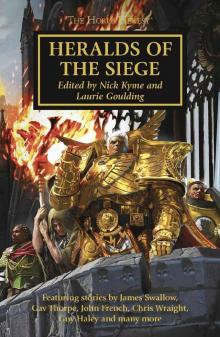 Heralds of the Siege
Heralds of the Siege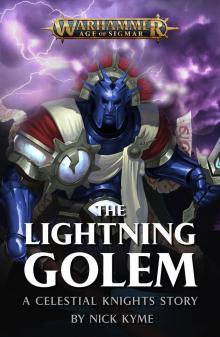 The Lightning Golem
The Lightning Golem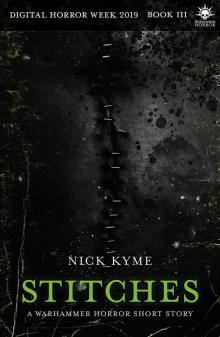 Stitches
Stitches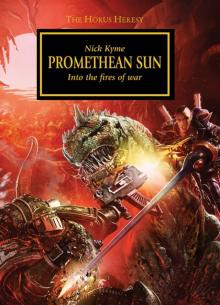 Promethean Sun
Promethean Sun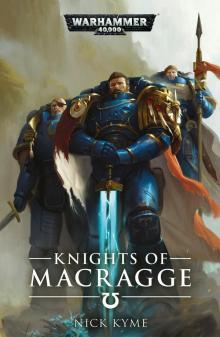 KNIGHTS OF MACRAGGE
KNIGHTS OF MACRAGGE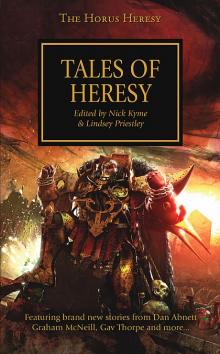 Tales of Heresy
Tales of Heresy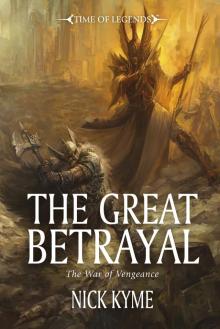 The Great Betrayal
The Great Betrayal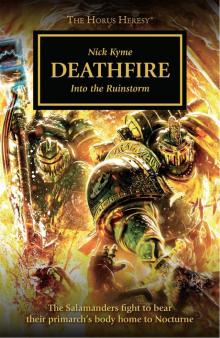 Deathfire
Deathfire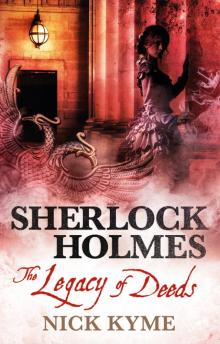 Sherlock Holmes--The Legacy of Deeds
Sherlock Holmes--The Legacy of Deeds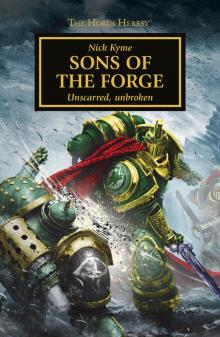 Sons of the Forge
Sons of the Forge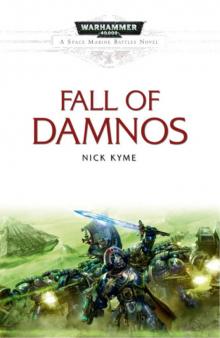 Fall of Damnos
Fall of Damnos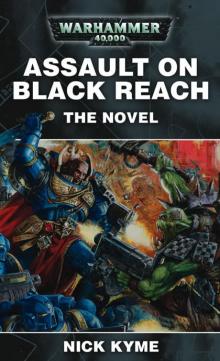 Assault on Black Reach: The Novel
Assault on Black Reach: The Novel![[Horus Heresy 10] - Tales of Heresy Read online](http://i1.bookreadfree.com/i/03/27/horus_heresy_10_-_tales_of_heresy_preview.jpg) [Horus Heresy 10] - Tales of Heresy
[Horus Heresy 10] - Tales of Heresy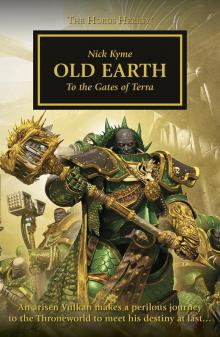 Old Earth
Old Earth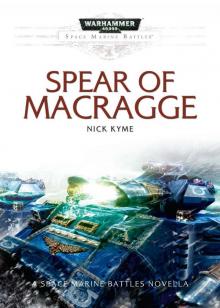 Spear of Macragge
Spear of Macragge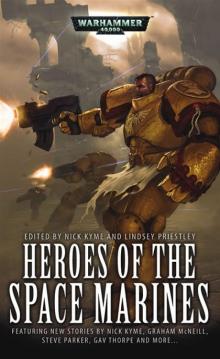 Heroes of the Space Marines
Heroes of the Space Marines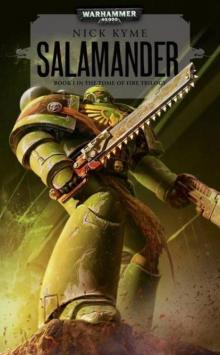 Salamander (warhammer 40000)
Salamander (warhammer 40000)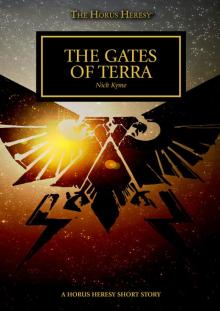 The Gates of Terra
The Gates of Terra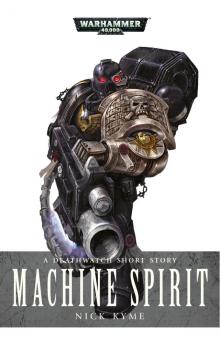 Machine Spirit
Machine Spirit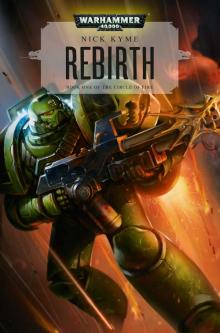 Salamanders: Rebirth
Salamanders: Rebirth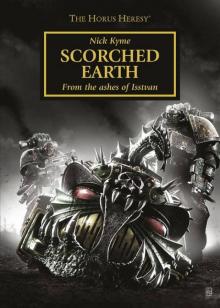 Scorched Earth
Scorched Earth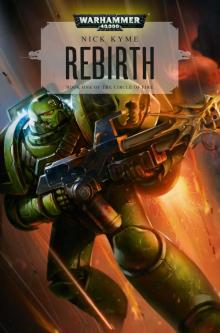 Rebirth
Rebirth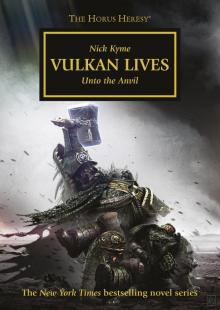 Vulkan Lives
Vulkan Lives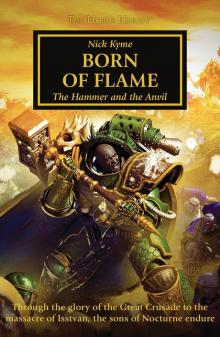 Born of Flame
Born of Flame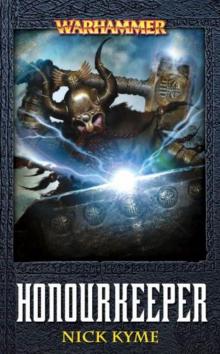 Honourkeeper
Honourkeeper